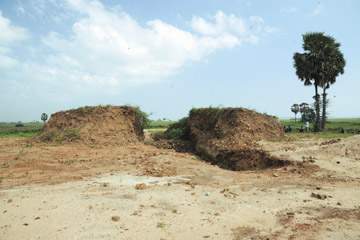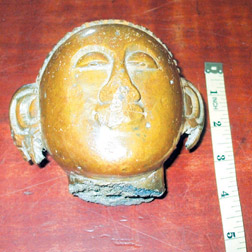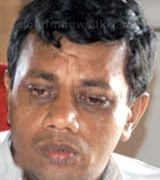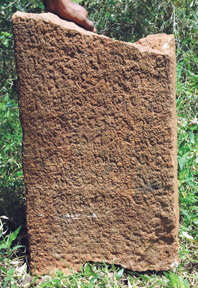|
Treasure hunting on the increase:
Stringent laws to check artifacts' theft
by Kurulu Koojana Kariyakarawana
|

Motteyagala Sagama Dageba
|
|

Head of a Buddha statue
|
Artifacts are considered as the precious remaining evidence of a
country’s bygone era. They not only hold a monetary value but also the
cultural value of a country’s heritage which makes them priceless.
Crafted and shaped by a human hand and dated back to pre-historic ages
the preservation of these materialistic goods for the future generation
is an important task that any responsible authority should perform.
However this has become quite challenging for the Department of
Archaeology since recently as a rise on the artifact theft and
destruction are quite evident.
A series of incidents related to theft and destruction of items with
an archaeological value reported throughout the past few months had
alerted the authorities to take prompt action to bring the culprits
before the law and also to control this unpleasant trend that could have
adverse effects on the country’s cultural heritage.
The latest incident was reported from Medirigiriya on Thursday where
the police arrested five persons in connection with illegal excavation
in search of artifacts.
The suspects who were reportedly from Wattala, Kadawatha and
Medirigiriya were taken into custody along with a vehicle and carrying
various tools and religious offerings. They were apprehended whilst
digging a remote land in sector two but no artifacts had been found. The
suspects were to be produced before Hingurakgoda Magistrate.On Tuesday a
similar type of incident was reported from Polonnaruwa where police
arrested several persons excavating a ten foot pit under a house floor.
The suspects had unearthed a set of items including remains of pots and
pans as well as pieces of rocks that belong to the seventh and the
eighth centuries of the Anuradhapura era. This was following several
other similar incidents reported from North – Central Province during
March.
|

Dr. Senarath Bandara
Dissanayake |
According to the official statistics of the Archaeological Department
the highest number of cases were reported in 2012 within the period of
March 4, 2008 to April 5, 2013. A total of 370 cases were reported in
the areas of artifact theft, destruction, illegal excavation and other
offences pertaining to the Archaeological Act. Out of the nine provinces
the highest number of cases was reported from North Central which is 82
and respectively 62 from North Western and 56 from Central province.
|

A stone inscription in Athurupalayagama |
An increasing trend is visible where 209 cases had been reported in
2008, 235 in 2009 and 294 cases in 2010. It has reduced to 220 cases in
2011. From January this year, 82 cases had been reported so far and 32
of them were from North Central Province where two main archaeological
cities Anuradhapura and Polonnaruwa are situated. All these years North
Central Province has the top figures respectively 45, 54, 84, 57, 82,
and 32 from 2008 to 2013. However, the least number of cases had been
reported from Northern Province which is a maximum of nine cases
reported in 2010.
The number of persons taken into custody in connection with these
cases top with a staggering figure of 1,062 suspects in 2012, 498 in
2011, 260 in 2010, 119 in 2009 and 141 persons in 2008 which is a clear
increase. 207 persons have already been rounded up during the first four
months of this year up to the fifth, which is an alarming figure.
Responding to these figures Director General Department of
Archaeology Dr. Senarath Bandara Dissanayake told the Sunday Observer
that this could be due to two reasons as there is an actual rise in such
activities or an increase on the reporting of such cases.
According to Dr. Dissanayake the trend of the excavations in search
of ancient treasures or artifacts is on the rise because of the changed
mindset of the people. “In ancient times people had a respect for these
treasures and artifacts which was considered as sacred and part of the
royalty.
The fear of ‘Bahiravaya’ and other evil elements that may befall them
was extreme for them to not to try anything unlawful. But today the
people have changed and the sort of respect and fear they had for such
elements do not exist.
Moreover, the people rely on earning money in an instant and easy
manner which leads them to engage in such unlawful activities. Doctor
Dissanayake said that preparations are already being carried out to
bring amendments to the 1998 No. 24 (Amended) Act by strengthening and
tightening the prevailing laws. As a result the maximum fine of Rs.250,
000 will be increased up to five million rupees (Rs.5, 000, 000) whereas
the minimum fine would be increased from Rs. 25, 000 to Rs. 500, 000.
Also, a prison sentence will be introduced.
In future not only the suspects but those who aid and abet them will
also be prosecuted including parties involved in illegal transporting of
artifacts.
Machinery and equipment as well as land vehicles used to destruct
archaeological reserves will also be confiscated according to the new
laws.
He said that these new laws had to be introduced except for the
earlier laws stated in Antiquities Ordinance of 1940 No. 9, due to the
severe violation of the act nowadays.
He said the department can now keep track of the records since the
Special Unit for Prevention of Destruction and Theft of Antiquities was
established in 2008.
Pix courtesy: Archaeological Department
[Hotline]
Special Unit for Prevention of Destruction and Theft of Antiquities
(SUPDTA) was established under the Department of Archaeology in 2008.
The special unit which acts like an immediate response unit maintains a
database of all the cases related to the theft and destruction of
artifacts reported countrywide and to coordinate with the police.
Backed by a special police unit to investigate into the instances of
violation of archaeological act was later transformed into a special
police division with more manpower in June 2012. As a result the unit
was able to appoint an individual archaeological police unit in each 26
Police Deputy Inspector General areas in all nine provinces.
Head of Special Unit for Prevention of Destruction and Theft of
Antiquities Udeni Wickramasinghe told the Sunday Observer the department
can act more efficiently and actively after establishing the special
unit. She said that whenever an unlawful activity is reported the local
police would inform the special unit and produce the suspect before the
Magistrate.
Although the suspect is produced in courts the Magistrate cannot
grant bail nor deliver a verdict without referring to a special report
prepared by the department stating the appropriate amounts of fines to
be imposed on that particular instance of violation of the act. The
special unit has opened a hotline for the public to inform any unlawful
activity regarding treasure hunting or breach of the archaeological act.
The telephone lines are working 24 hours.
Special Unit Hotline - 0117-222333
Special Police Unit - 0112-694727
Department of Archaeology - 0112-692840-1 |


